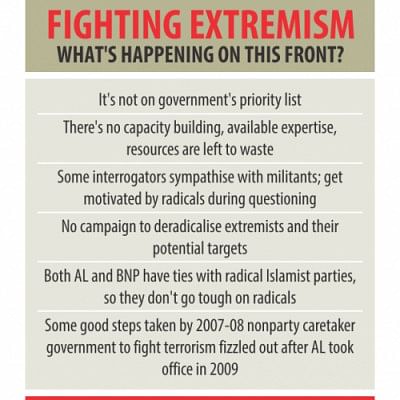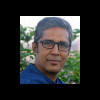Radicalism growing freely

The fight against rising extremism sees no results mainly for three reasons -- problems within law enforcement agencies, poor political will of the government and a general inability of the masses and even a section of law enforcers to separate religion from radicalism.
Taking advantage of all these, religious fundamentalists are growing in numbers and in strength and are attacking freethinkers, say investigators and security experts. They fear that more such attacks may take place in the coming days.
One of the biggest problems lies with the law enforcers tasked with countering extremism. They grapple with multiple problems -- inefficiency, lack of logistics, infighting, non-sharing of intelligence and no capacity-building on counterterrorism, just to name a few.
And confusions over the government's political will or lack of it make things worse for law enforcers. True that the government gets kudos from around the world for its much publicised anti-militancy policy. But the fact remains that it has not waged any effective war on the ground against the ever-growing threat.
The proposal for a National Police Bureau of Counter Terrorism, for example, is gathering dust at the Prime Minister's Office for seven years now, and a nationwide campaign to create public awareness against radicalism lost its way years ago.
The general trend is that the party in power tries to keep radicals happy, the party in opposition looks for opportunities to incite them and law enforcers do not -- and cannot -- do anything other than what they are told to.
In the meantime, more bodies are added to the body count. This year alone, four bloggers known for their freethinking writings have been hacked to death by suspected militants. Then came the recent spell of random killings. Since late September, two foreigners, two cops and a publisher lost their lives and an Ashura gathering of the Shia Muslims was bombed for the first time in the Sunni-majority Bangladesh, killing two people.
Probes are on, and investigators are not ruling out that militants might have a hand in some of these, if not all.
COPS: INTERROGATORS OR SYMPATHISERS?
Shockingly, there is no proper manual to systematically train law enforcers on counterterrorism.
Many of them cannot even distinguish religion from its twisted versions propagated by fundamentalists. Typically, many cops consider Islamists as "pious".
"During interrogations, police show sympathy to militants, treat them softly and in some cases get motivated by them," said an officer with direct knowledge of such interrogations.
Giving an example, he said that about a year ago a militant leader asked for some water during questioning. Two officers jumped off their seats together and rushed to bring water as the person was a so-called hujur, therefore, pious in their eyes.
"This tendency is high among lower-tier police members," he noted.
As a result, arrested militants enjoy a special status in prison, meet visitors freely, use cell phones and operate from jails, multiple investigators told The Daily Star.
"Counter-motivation and interrogation language training for interrogators can put a stop to their wrong perceptions and prevent them from being misguided or motivated by militants in custody," one investigator said.
But the worry is only the officers with the rank of assistant superintendent of police are given primary training on techniques to quiz militants during a yearlong programme at the Police Academy. There is no such training for sub-inspectors, assistant sub-inspectors and constables who as field-level cops have a vital role to play in fighting religious fundamentalism.
Security experts say the government treats the terrorism cases like ordinary criminal cases, as fighting extremism is not on its priority list. Police members are witnesses in many of the cases filed for terrorism over the past few years, but many of them do not appear in court to testify.
At least 154 militants have been sentenced to death over the last several years, but the verdicts are yet to be executed, sources said.
COMPETITION BETWEEN AGENCIES
Coordination among law enforcement and intelligence agencies, and sharing of intelligence are crucial for high-profile crime investigation.
But Bangladesh has a different practice. An unhealthy competition between agencies is on, and various agencies work separately and try to showcase their successes and discredit each other by capturing suspected militants, fake or real, according to insiders.
There are numerous examples where the arrest of some suspected militants by one agency led to the capture of more suspects by another.
"The fact is, they arrested some petty criminals and branded them as militants to get credit," said a senior officer of a law enforcement agency on the recent arrests of a group of suspects by another agency.
The Detective Branch (DB) of police and the Rapid Action Battalion (Rab) are credited with capturing most of the militant suspects in recent years.
Formed as a special counterterrorism force, the Rab is well-equipped and makes regular arrests of suspected militants and criminals. However, the elite force is not playing a proactive role in combating extremism due to its "rivalry" with another agency, according to sources in both the agencies.
"A breakthrough in the investigation of the repeated attacks and killings of freethinkers could be made if all the logistics, expertise and intelligence could be utilised in coordination," observed one officer.
In 2009, the counterterrorism unit of police was put on hold because an intelligence agency of a force wanted to be a part of it but the police and the government did not want it to be.
POOR POLITICAL WILL
The AL government rode to power seven years ago promising, among other things, to go tough on terrorism. But almost halfway through its second consecutive term, it failed to translate its words into action.
Worse, a nationwide sociopolitical and religious campaign involving imams and teachers initiated by the caretaker government in 2007-08 has gradually fizzled out under Sheikh Hasina's watch.
Under the campaign, anti-militancy sermons in mosques and statements at schools, screening plays and documentaries on TV and in public places to educate people about the evils of extremism were considered effective tools to fighting terrorism, but it did not continue.
"Misguiding and motivating people into the destructive path of extremism is easy," a home ministry official told this correspondent.
Speaking at a counterterrorism seminar in Dhaka last week, Indian security expert Syed Ata Hasnain said, "Fight against terrorism can't be won without engaging people."
But there is no such engagement of people in Bangladesh. And the government's commitment to this end is in question, as it sits on a proposal to establish a counterterrorism unit, which many countries have already developed to fight the growing danger.
There is another big concern. While on the one hand there is nothing -- no campaign, no publicity -- in place for deradicalisation, there are all elements of radicalisation on the other.
Religious sermons and teachings in hundreds of Qawmi madrasas across the country often promote fundamentalism and spread religious intolerance and hatred, security experts say, adding that Qawmi madrasas are the "hub of radicalisation".
Also, the arrested militants who are under trial or awaiting trial meet followers in courts and use this opportunity to radicalise them further. Inside the prison, they motivate inmates, creating new followers.
NO CAPACITY-BUILDING
Alleged corruption and political favouritism in recruitment are the reasons why the standard training for cops is compromised, leaving the recruits unfit for efficient policing against extremism.
Those who received training over the years at home were not allowed to develop expertise and enhance their ability to fight the evil force. And most of those who took advanced training and studied counterterrorism abroad are not engaged in counterterrorism.
One such police officer -- who took specialised training in various countries during his four-year engagement in combating militancy and is considered one of the few experts in the field -- was transferred to a district recently to look after overall law and order.
Similarly, a female officer who completed a higher degree on counterterrorism abroad is now posted at the Police Staff College.
"This is a total waste of expertise and resources," said an officer with knowledge of these developments.
On the other hand, in some cases the extremists are better trained and technologically more advanced than law enforcers, added the officer, asking not to be named as the matter is sensitive.
Nur Mohammad, former inspector general of police who is now secretary to the youth and sports ministry, said officers should be assigned on consideration of their ability and expertise.
"Desired results will not come if the right officers are not placed at the right positions," he told The Daily Star.
ALL PARTIES ARE TO BLAME
Religious extremism emerged and took root under political governments as both the parties in power and in the opposition used the religion card to win support of the Islamists.
Terrorism thrived during the BNP-Jamaat rule in 2001-06. When the now banned militant outfits JMB and Huji emerged as a serious threat, the BNP-Jamaat government at first denied their existence, but was eventually compelled to arrest some top militant leaders, including Bangla Bhai and Shaikh Abdur Rahman.
However, though the arrests of some top militants and their trial began back then, it was the nonparty caretaker government that successfully clamped down on militancy, capturing all top militant leaders and quickly punishing them in 2007-08. In 2007, six top militants, including Abdur Rahman and Bangla Bhai, were executed.
To keep the momentum, the caretaker government initiated a socio-cultural and religious campaign against extremism. A National Integrity Strategy was also formulated, implementation of which could have made people aware against radicalism, injustice and corruption.
Both initiatives lost their way after the AL took office in 2009, though on papers the party has a "zero-tolerance" policy for terrorism.
People's doubt about AL's "anti-militancy stance" is furthered by the party's silence about its ally Awami Ulama League's radical statements, the latter's demand for a law with provisions for death penalty for demeaning Islam, cancellation of "anti-Islamic" education policy, and confiscation of textbooks containing write-ups of "anti-Islamic and atheist" writers.
On the other hand, majority of the BNP's allies are in religion-based politics. Many leaders of these Islamist parties were directly involved in militant activities. Still, the BNP heavily relies on them to topple the government and return to power.
Party leaders would not go on record, but on condition of anonymity, both the camps said they would not do anything that might "hurt even a single person and cost even a single vote".

 For all latest news, follow The Daily Star's Google News channel.
For all latest news, follow The Daily Star's Google News channel. 



Comments